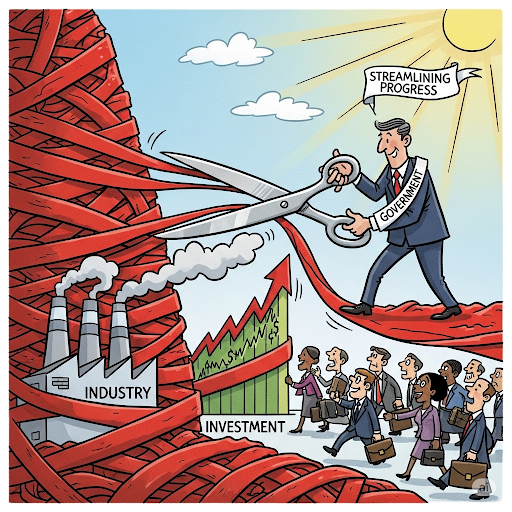Indonesia Aims to Slash Red Tape With Automatic Investment Approvals
New regulation empowers BKPM to approve permits if technical ministries delay action
Indonesia has rolled out a sweeping regulatory reform aimed at accelerating investment approvals by introducing an automatic permit issuance system — a move seen as a bold push to remove bureaucratic bottlenecks and stimulate economic growth.
Under Government Regulation No. 28/2025, if technical ministries fail to act on business licensing requests within a specified time, the Investment Coordinating Board (BKPM) will be authorized to issue permits automatically through the Online Single Submission (OSS) system. The regulation is part of President Prabowo Subianto’s broader agenda to streamline the country’s investment climate and improve ease of doing business.
The regulation introduces service level agreements (SLAs), compelling ministries and government agencies—both at the central and regional levels—to process business permits within a fixed timeframe. Should they fail to meet the deadline, the system will automatically proceed to the next licensing stage without further delay.
BKPM Chairman Bahlil Lahadalia emphasized that the new system represents a “red carpet” for investors, eliminating long-standing complaints over red tape and delays. “This sends a strong signal that Indonesia is serious about welcoming investment,” he said in a press conference.
A key feature of the reform is a risk-based licensing approach, where low-risk business activities—particularly those involving small and medium-sized enterprises (SMEs)—can obtain permits with minimal administrative requirements.
Moreover, the regulation embeds a “risk-positive” policy whereby permits are presumed granted unless compelling risks or objections are formally raised by the relevant agencies. This inversion of the burden of proof is intended to speed up business operations and reduce procedural inertia.
The OSS system will now serve as the default gateway for permit applications. If technical ministries or local agencies do not verify the application within the agreed SLA period, BKPM will issue the permit on their behalf. This automation is designed to prevent application backlogs and ensure that investor timelines are respected.
However, investors will still bear full responsibility for ensuring that their operations meet environmental, safety, and technical standards. Regulatory documents such as Environmental Impact Assessments (AMDAL) and Environmental Management Efforts (UKL-UPL) remain compulsory for applicable sectors, albeit with a simplified process.
The new rules pay special attention to Indonesia’s vast base of SMEs. Licensing procedures for micro and small enterprises will be further simplified, with fewer documentation requirements and quicker turnaround times.
The regulation also establishes a Monitoring and Evaluation Task Force (Wasdal) to oversee the implementation of the policy and intervene in cases of non-compliance.
The reform comes as the Indonesian government sets an aggressive five-year investment roadmap. It aims to more than double total investment from Rp1,607 trillion ($102 billion) in 2025 to Rp3,414 trillion ($217 billion) by 2029. Officials hope the simplified licensing mechanism will help attract both domestic and foreign direct investment.
Investment Targets 2025–2029 (in trillion rupiah):
2025: Rp 1,607
2026: Rp 2,175
2027: Rp 2,567
2028: Rp 2,936
2029: Rp 3,414
BKPM estimates that reaching these targets will require aggressive downstreaming of natural resources, infrastructure expansion, and growth in manufacturing, energy, and digital sectors.
Indonesia’s Incremental Capital Output Ratio (ICOR) — a measure of the capital efficiency of economic growth — has been trending downward, indicating a more effective use of investment. According to government data, ICOR dropped from 6.62 in 2022 to 5.33 in 2024, signaling improved productivity.
Indonesia’s ICOR (Capital Efficiency):
2021: 8.66
2022: 6.62
2023: 6.33
2024: 5.33
Lower ICOR values mean the economy can generate higher output per unit of investment — a positive sign for investors seeking more predictable returns.
The regulation has been welcomed by business associations and private sector stakeholders. Arsjad Rasjid, chairman of the Indonesian Chamber of Commerce and Industry (KADIN), called the move “a long-awaited step” that signals Indonesia’s shift toward a more investor-friendly regulatory environment.
Tech firms managing digital permit services, such as Indonesiae-Permits, said they are upgrading OSS integration to meet the new automated verification standards.
“This is the reform we’ve been pushing for,” said a foreign investor involved in industrial estates. “If it’s implemented properly, this could be a game-changer for capital inflows.”
Government Regulation No. 28/2025 represents Indonesia’s most ambitious step yet in removing red tape from investment licensing. While its success will depend heavily on consistent enforcement and bureaucratic discipline, the message is clear: Indonesia is ready to open its doors wider to global investors — and it’s rolling out the red carpet.




